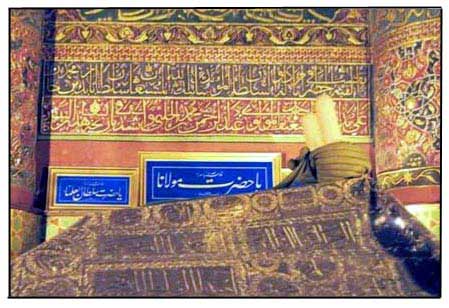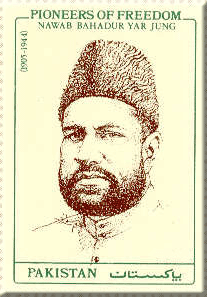
Maulidur Rasul a bridge to Divine Mercy
Gabriel Haddad,BANDAR SERI BEGAWAN
Monday, April 14, 2008
A Blessed Quranic verse often mentioned in Maulud celebrations over the world conjures us, "In the bounty of God and in His mercy: therein alone let them rejoice — It is better than what they hoard!" (10:58). The greatest exegete Ibn Abbas said: "The bounty of God is The Science, and His mercy is The Prophet." Accordingly, the two months of Rabiul Awwal and Rabiul Akhir (March-April this year) see many Bruneians take to special gatherings in mosques and homes in which they recite, among other zikir texts, Maulid Syaraful Anam (The Birth of the Pride of All Creatures) and Maulid Daybai (compiled by the Yemeni scholar Abdur Rahman al-Daybai). This practice is rooted in the very beginnings of Islam.The historian Ibn Sayyid al-Nas relates that when the Prophet conquered Mekah, he turned to his poet Hassan bin Thabit and asked him to recite something extemporaneously, whereupon Hassan replied:
Pillar of those who rely on you,
Immunity of those who seek refuge in you,
Resort of those who seek herbiage and rain,
and Neighbouring Protector of those in need of shelter —
You whom the One God has chosen for His creatures
by planting in him perfection and purity of character —
You are The Prophet! You are the best of Human Kind.
Open-handed one, like the outpouring of a swelling sea —
Both Mikal and Jibril are with you,helpers to victory,
sent by One Mighty, Irresistible!
Thus, the recitation of poetic praise of the person (and not just qualities) of Prophet Muhammad, upon him blessings and peace, began in his very lifetime at the hands of his Companions, who left no stone unturned in fulfillment of the Divine command in the Holy Qur'an to "invoke abundant blessings and lavish salutations of peace on him" (33:56) and rejoice in his blessed person. Whoever hears his name and is not instantly moved to bless him, in fact, is characterised in the Hadith as a rank miser.Blessing him was — and is — an easy command to fulfill, since it was the very person of the Prophet and the very fact that he had been created which impelled those who knew him to extol him to their fervent utmost — not with noses buried in booklets as we tend to do today, but with thundering emotions and unbridled, hyperbolic joy. Thus did al-Abbas bin Abd al-Muttalib, the Prophet's uncle and one of the major Companions, explicitly refer to the Prophet's Birth when he addressed him before the crowd of the Sahaba:
When you were born, the sun rose over the earth and the horizon was illumined with your light.
So we — in that radiance, that light, those paths of guidance — can pierce through!
In the wake of the early generations, the Ulema of Islam through the centuries similarly vied in poetic and historical praise of the Prophet. Uniquely famous in the genre is the 162-line poem formally entitled al-Kawakib al-Durriyya bi-Mad-hi Khayr al-Bariyya, "The Stellar Pearls in Homage to the Best of All Creation" but commonly known as Qasidat al-Burda or "The Mantle Poem" by the pious Moroccan littérateur Sharafuddin al-Busiri. This masterpiece of Arabic sensibility is sung from East to West in countless gatherings, especially at this time of the year, and contains lines of unsurpassed beauty among panegyrics, though virtually untranslatable:(Muhammad) Whom lofty mountains endeavoured to turn from himself with offerings of gold, whereupon he showed them greater loftiness,
And what confirmed that he renounced them was his need:
Even dire need has no sway over those God makes immune!
For how can need attract to the world the one were it not for whom the world would not have come out of the void?
The title of this great poem is derived from two incidents, one historical, the other a dream. The first took place when an earlier lover of the Prophet, the Companion Kaab ibn Zuhayr, recited a similar poem before the Prophet which contained the line inna al-rasula la-nurun yustada'u bihi, "Verily the Prophet is a light from which one's light is sought". Upon hearing this moving line, the Prophet rose and placed his mantle on Kaab's shoulders as a gift of appreciation. The dream was experienced almost seven centuries later when al-Busiri (d 696 H), at the time partly paralysed by a stroke, was visited by the Prophet who, in the same gesture, placed his mantle on al-Busiri's shoulders in appreciation of the latter's poem, whereupon he woke up hale and sound.One of the last caliphs of the Ottoman State, the pious Sultan Abd al-Hamid Khan ibn al-Sultan Ahmad Khan looked back to al-Busiri's lines when he began his own poem in praise of the Prophet with the line Ya sayyidi ya rasulallahi khudh bi-yadi ("My liegelord, Messenger of God, take my hand!"). This poem was calligraphied in full on the walls of Lady Aisha's room where the Prophet(saws) was laid to rest in Madinah. Al-Busiri himself had looked back to Hassan ibn Thabit both in form and content: both the Burda and Sultan Abd al-Hamid used the kamil or "perfect" metre chosen by Hassan ibn Thabit in the four lines he had improvised for the Prophet.The perennial theme is the Prophet as humanity's last and greatest hope. The Qur'an names the Prophet "nothing but a Mercy to the Worlds" and the Prophet describes himself in the Hadith as "nothing but a Gift of Mercy". Maulid poems seek to capture the direct experience of that Divine Mercy. In the following lines from al-Daybai's Maulid Eulogy we recognise the longing cry familiar to visitors to Madinah:
There stands the Green Dome wherein is found a Prophet whose light dispels pitch darkness!True has his good pleasure with us proved, as communion grows nearand commendation greets us from all sides.
Say to your soul: Enough delay! Today from the Beloved no veil blocks us.
Your fill of the Beloved take, therefore, to all intents.Felicity is ours, banishing opposites!Similarly we hear, among the delicate lines of Brunei's oft-recited Maulid Syaraful Anam:
Best of all those who trod the earth, whom all creatures seek for intercessor,
By him break the shackles of every sinful slave,There is no one like him, by whom triumph all followers;
Whoever dies loving him reaps every imaginable prize!
The Qur'an compares human hearts to hard rocks but adds that water is known to gush even from rocks. Our own hearts may also melt when we experience poetry praising our Beloved Prophet the way he deserves to be praised, and tap its treasures for the refreshment of our souls.The Brunei Times
This morning on the 9th March 2009, Brunei Darussalam celebrated birthday anniversary of Prophet Muhammad SAW with mass gatherings and processions in all four districts. The theme for this year is “Kedewasaan Bernegara Dengan Zikir” (Maturing of Brunei as a Zikir nation)In conjunction with Maulud (Birth of the prophet), gathering and procession in the Belait District was held at the Kuala Belait Municipal Field.
Majlis Maulidur Rasul yang diadakan setahun sekali di Taman Sir Omar Ali Saifuddien






















































